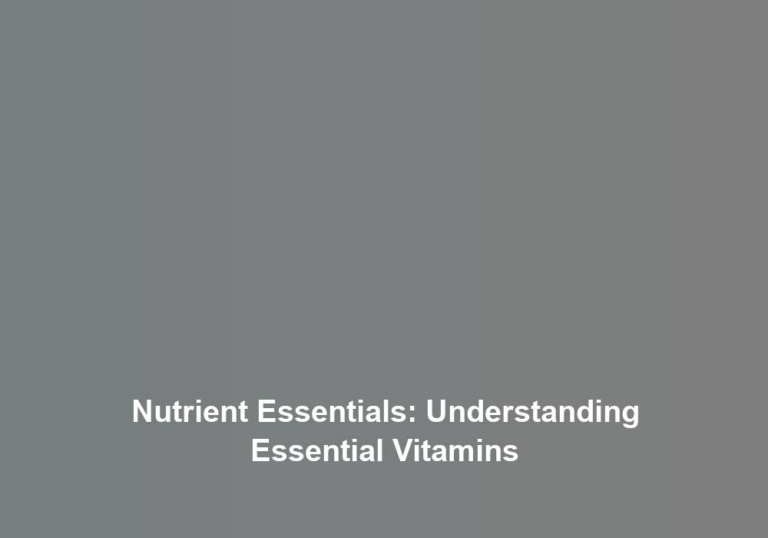Weight Loss Supplements: Your Guide to Dietary Supplements
YouG??ve probably heard the saying, G??You are what you eat.G?? When it comes to weight loss, this adage holds true, and dietary supplements can play a role in achieving your goals. But with so many options available, itG??s important to navigate the world of weight loss supplements with caution. How do you know which ones are safe and effective? LetG??s explore the ins and outs of dietary supplements, uncovering the benefits and potential risks, and discover how to incorporate them into your weight loss routine for optimal results.
Understanding Weight Loss Supplements
To understand weight loss supplements, itG??s essential to examine their ingredients and potential effects on your body. When considering weight loss supplements, safety and regulation should be a top priority. The Food and Drug Administration (FDA) regulates dietary supplements under a different set of regulations than those covering G??conventionalG?? foods and drug products. It is important to look for supplements that have been tested for safety and quality. Also, keep in mind that just because a supplement is labeled G??naturalG?? doesnG??t mean itG??s safe. Some natural ingredients can have powerful effects on the body, and itG??s crucial to understand how these may interact with any medications youG??re taking or existing health conditions you may have.
Effectiveness is another crucial aspect to consider when evaluating weight loss supplements. ItG??s essential to be cautious of supplements that make extravagant claims. Look for scientific evidence to support the productG??s effectiveness. Be wary of anecdotal evidence or testimonials without scientific backing. In the realm of weight loss supplements, scientific evidence is key. Look for supplements that have undergone rigorous clinical trials and have been proven to be effective.
Understanding the safety and regulation of weight loss supplements, as well as seeking scientific evidence of their effectiveness, is vital for making informed decisions about which supplements to incorporate into your weight loss journey. Always consult with a healthcare professional before starting any new supplement regimen.
Types of Dietary Supplements
When it comes to weight loss supplements, itG??s important to understand the different types of dietary supplements available to you. Knowing the popular supplement types, their benefits and risks, and how to choose the right one for your needs can help you make informed decisions. By understanding the various options, you can better navigate the world of dietary supplements and find the best fit for your weight loss journey.
Popular Supplement Types
Various types of dietary supplements are widely used for weight loss, including fat burners, appetite suppressants, and metabolism boosters. Herbal supplements, derived from natural ingredients such as green tea extract, bitter orange, and garcinia cambogia, are popular for their potential to aid in weight management. These supplements are often perceived as gentler on the body and may be an attractive option for those seeking a more natural approach to weight loss. On the other hand, prescription supplements, such as Orlistat and Phentermine, require medical advice and can only be obtained through a healthcare professional. These supplements are typically recommended for individuals with a higher BMI or those with weight-related health issues. ItG??s crucial to consult with a healthcare provider before starting any new supplement regimen to ensure it aligns with your specific health needs.
Benefits and Risks
As you consider the benefits and risks of different types of dietary supplements for weight loss, itG??s essential to be well-informed about the potential impact on your health and weight management goals. HereG??s a quick overview of the benefits and drawbacks of some common weight loss supplements:
| Supplement Type | Benefits | Drawbacks |
|---|---|---|
| Green Tea Extract | Metabolism boost, antioxidant properties | Caffeine sensitivity, potential liver issues |
| Garcinia Cambogia | Appetite suppression, potential fat-blocking properties | Inconsistent research results, digestive issues |
| Conjugated Linoleic Acid (CLA) | Fat loss, lean muscle retention | Digestive issues, potential insulin resistance |
| Hydroxycitric Acid (HCA) | Appetite suppression, potential fat-blocking properties | Digestive issues, potential liver damage |
Choosing the Right One
To choose the right dietary supplement for weight loss, carefully evaluate the potential benefits and risks of each type, considering your individual health needs and goals. When finding the right, effective supplement, itG??s essential to navigate through supplement marketing hype. Look for scientific evidence supporting the supplementG??s claims. Recognizing supplement quality is crucial. Choose supplements that have been tested by a third-party organization, like NSF International, Informed-Choice, or USP. These organizations test for purity, potency, and overall quality. Avoiding harmful ingredients is also important. Be cautious of supplements containing potentially harmful substances such as ephedra, which is banned by the FDA due to serious health risks. Always consult a healthcare professional before starting any new supplement regimen to ensure it aligns with your health needs and goals.
How Weight Loss Supplements Work
Weight loss supplements work through various mechanisms to help you achieve your weight loss goals. They may affect your metabolism and fat utilization, leading to increased calorie burning. Additionally, some supplements may help suppress your appetite, making it easier to control your food intake.
Mechanism of Action
Clinical studies have demonstrated that weight loss supplements primarily work by affecting the bodyG??s metabolism and appetite control. These supplements can help in various ways, such as increasing fat oxidation, reducing calorie absorption, or suppressing hunger. Below is a table summarizing the different mechanisms of action of weight loss supplements:
| Mechanism of Action | Description |
|---|---|
| Increased Metabolism | Some supplements may boost metabolic rate, leading to more calories burned. |
| Appetite Suppression | Certain supplements can help reduce cravings and promote feelings of fullness. |
| Fat Blocking | Some supplements may inhibit the absorption of fats, reducing overall calorie intake. |
Understanding the mechanism of action of weight loss supplements can help you make informed choices when selecting the right supplement for your weight loss journey. Always consult with a healthcare professional before starting any new supplement regimen.
Metabolism and Fat
How do weight loss supplements affect metabolism and fat? Weight loss supplements can impact metabolism and fat through various mechanisms, helping you achieve your weight loss goals. HereG??s how they work:
-
Metabolism Boosters: Some supplements contain ingredients like green tea extract or caffeine, which can help increase your metabolic rate, leading to more calories burned throughout the day.
-
Fat Burning Techniques: Certain supplements may contain compounds that aid in fat oxidation, essentially helping your body break down stored fat more efficiently.
-
Appetite Suppression: Some supplements can help reduce cravings and appetite, leading to lower calorie intake and potential weight loss.
-
Energy Boost: Many weight loss supplements contain ingredients that provide a boost in energy, which can help support your workout routine and overall physical activity levels.
Appetite Suppression
After understanding how weight loss supplements impact metabolism and fat, it is crucial to explore their role in appetite suppression. Appetite suppression is one way that weight loss supplements help you manage your weight. Many of these supplements contain natural ingredients like green tea extract, fiber, or certain plant extracts that can help you feel fuller for longer, reducing your overall calorie intake. ItG??s important to note that while appetite suppression can aid in short-term weight loss, itG??s essential to consider the long-term effects of using these supplements. Some may have side effects or may not be suitable for extended use. Always consult with a healthcare professional before starting any weight loss supplement regimen to ensure it aligns with your health goals and needs.
Potential Benefits of Dietary Supplements
When considering the potential benefits of dietary supplements, itG??s important to examine the evidence supporting their efficacy and safety. In the context of weight loss, dietary supplements can offer several potential benefits backed by nutrition science. Here are some of the potential benefits to consider:
-
Supporting Nutrient Intake: Some weight loss supplements contain essential vitamins and minerals that may be lacking in your diet, such as vitamin D, calcium, or iron. These supplements can help ensure that your body receives all the necessary nutrients for overall health and wellness.
-
Metabolism Boost: Certain supplements, such as green tea extract or caffeine, have been shown to have a modest impact on boosting metabolism. This can potentially aid in weight management when combined with a balanced diet and regular physical activity.
-
Appetite Control: Some supplements, like fiber supplements or certain plant extracts, may help promote feelings of fullness and reduce overall calorie intake, which can support weight loss efforts.
-
Energy Enhancement: Ingredients like caffeine or green tea extract can provide a temporary energy boost, which may support physical activity and exercise performance, contributing to overall weight management.
ItG??s important to note that while these potential benefits exist, individual responses to supplements can vary, and not all supplements are suitable for everyone. Consult with a healthcare professional before adding any new dietary supplements to your regimen, especially if you have underlying health conditions or are taking medications.
Risks Associated With Weight Loss Supplements
Considering the potential benefits of dietary supplements for weight loss, itG??s crucial to be aware of the potential risks associated with these products. While weight loss supplements can offer a quick fix, they also come with potential dangers and long-term effects that should not be overlooked.
One of the major risks associated with weight loss supplements is the lack of regulation in the industry. Many of these supplements are not subject to the same rigorous testing and safety standards as prescription medications. As a result, there is a higher risk of contamination, misleading labeling, and undisclosed ingredients, which could pose serious health risks.
Furthermore, some weight loss supplements contain stimulants that can have adverse effects on the cardiovascular system, such as increased heart rate and elevated blood pressure. These effects can be particularly risky for individuals with pre-existing heart conditions or high blood pressure.
Long-term use of certain weight loss supplements has also been linked to liver damage, kidney problems, and gastrointestinal issues. Additionally, these products can have a negative impact on metabolism, making it even more challenging to maintain weight loss in the future.
ItG??s important to approach weight loss supplements with caution and to consult with a healthcare professional before incorporating them into your routine. Be mindful of the potential dangers and long-term effects, and prioritize sustainable, evidence-based strategies for weight management.
Incorporating Supplements Into Your Routine
Incorporating weight loss supplements into your routine should be done cautiously and under the guidance of a healthcare professional to ensure safety and effectiveness. When integrating supplements into your daily routine, consider the following:
-
Consult a Healthcare Professional: Before adding any weight loss supplement to your routine, consult with a healthcare professional who can provide personalized advice based on your health status and weight loss goals.
-
Research Supplement Effectiveness: Look for scientific evidence supporting the effectiveness of the supplement you are considering. Not all supplements are created equal, and some may have little to no impact on weight loss.
-
Understand Daily Intake: Pay close attention to the recommended daily intake of the supplement. Taking more than the recommended amount can lead to adverse effects and may not enhance the supplementG??s effectiveness.
-
Monitor Your Progress: Keep track of your progress and any changes in your overall well-being. If you experience any negative effects or do not see the desired results, consult your healthcare professional to reassess your supplement regimen.
Incorporating weight loss supplements into your routine can be a valuable tool in your weight loss journey. However, it is essential to approach it with caution, ensuring that you are making informed decisions that prioritize both your safety and the effectiveness of the supplements you choose.
Conclusion
In conclusion, weight loss supplements can be a helpful addition to your routine, but itG??s important to do your research and consult with a healthcare professional before starting any new supplement. While they may offer potential benefits, there are also risks to consider. Remember to always prioritize a balanced diet and regular exercise as the foundation of any weight loss journey. So, before you reach for that supplement, weigh the pros and cons carefully. After all, knowledge is power.







